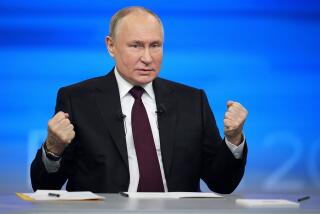Face-Off in Moscow
- Share via
The message that Soviet leader Mikhail S. Gorbachev delivered to the opening session of this week’s extraordinary Communist Party conference in Moscow combined candor about the country’s severe economic sickness with caution about some of the more radical remedies thathave been proposed. The response from the nearly 5,000 delegates who are meeting in the Kremlin indicated pretty clearly that they liked the cautious parts best. Indeed, one of the general secretary’s few applause lines came when he denounced “irresponsible” efforts to rush toward greater democracy and economic efficiency. That was music to the ears of the many party officials present who know that their own well-being depends on leaving the status quo pretty much undisturbed.
Gorbachev’s caution might have been less pronounced had he succeeded in packing the conference with his kind of people. Instead, reflecting the continuing resistance to change within the party and the bureaucracy, he has been forced to put his reformist program before an audience chosen by other party apparatchiks who are less than fully committed to doing things differently. For all that, there was no mistaking the urgency behind Gorbachev’s call for new ways to try to revive an economy so ideologically hidebound that --except in the military area--it is unresponsive to real national needs.
Gorbachev’s prescription for change is essentially the same that he has been promoting since he took power three years ago, although he now concedes that he should have pushed for much more much earlier. He wants to see big strides toward economic decentralization, with controls on agriculture, industry and private business relaxed or lifted and the marketplace allowed a more prominent role. He wants the national standard of living raised--a process that will require ensuring better supplies of food and more and better housing. The present system has proved incapable of doing these things. And so Gorbachev wants to change the system, and boldly.
That change would separate party and state, transferring the administrative powers that are now wielded by the party to a popularly elected congress that in turn would choose a president. The Soviet Union would remain a one-party state, and the party would continue to set overall policy. But the policy would be carried out, presumably with greater efficiency, by people who in theory at least are more attuned to the national will. The party, in short, would give up the monopoly on political power that it has held since Lenin’s time.
Can Gorbachev carry it off? He has confessed to the Moscow conference his frustration with the continuing obstructionism of party functionaries whom he now calls on to voluntarily shed many of their powers. The chances of that happening do not seem great. At the same time, Gorbachev has been unsparing in describing the economic mess that the Soviet Union faces. He has posed a stark choice: political inertia and worsening stagnation or working for change. The outcome of the secret debate on these issues that is now under way will almost certainly shape Soviet life for years to come.
More to Read
Sign up for Essential California
The most important California stories and recommendations in your inbox every morning.
You may occasionally receive promotional content from the Los Angeles Times.













